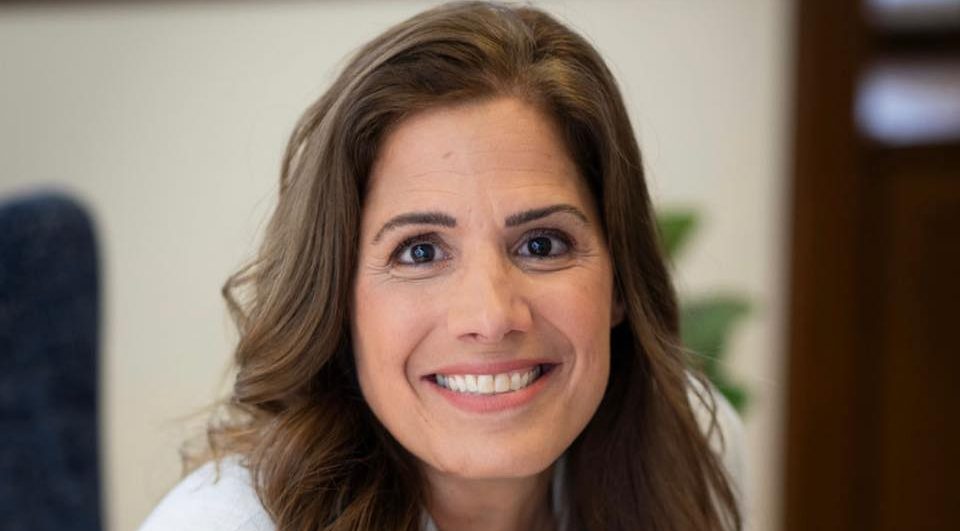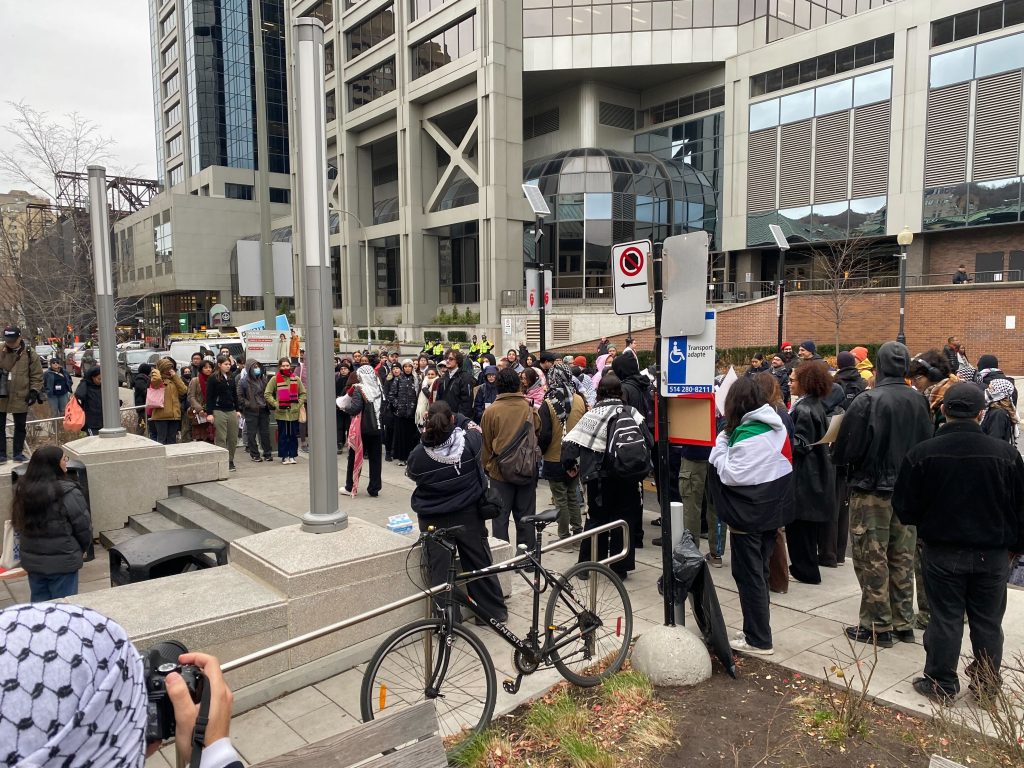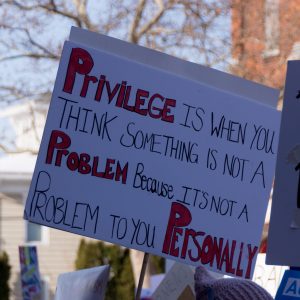Following months of reports from Jewish students and others about tension surrounding the Middle East conflict in publicly funded colleges, Quebec’s education minister Pascale Déry’s investigation into the provincial academic climate is being slammed by some teachers, unions, and political opponents.
Last fall, Déry announced an investigation, after reports of harassment, abuse of podium, bullying on student votes, and tension surrounding the Nov. 21 Quebec student strike.
“The climate in some CEGEPs is becoming more and more toxic” she stated on social media. “The situation has escalated, and incidents have piled up: hate speech, students being bullied and fearing for their safety… The safety of students and their right to study in a healthy environment is non-negotiable, and for an institution to feel forced to close its doors (as Dawson College did on Nov. 21) is unacceptable.”
Quebec’s General and Vocational Colleges Act authorizes Déry to “inquire into any matter relating to the educational methods, administration or operation of a college. The Minister may also designate a person to inquire into any behaviour that could reasonably pose a threat for the students’ physical or psychological safety.”
Her ministry is mum on details to date, and Déry herself refused to comment further until she has the investigators’ report. Her spokesperson would not comment on a timeline, saying only that reports stemmed from both schools and no comments or information would be divulged “out of respect for the various processes underway.”
Now, her recent inquiries to administrations about some French and English classes in Dawson, Vanier and John Abbott Colleges, focusing on Palestine during what she deems an “explosive” situation on campuses, has prompted accusations of censorship and an attack on academic freedom.
‘Witch hunt’ accusations
A number of local February news reports quoted a small group of teachers and union representatives, likening the investigation to a “witch hunt” and complaining about interference—with the union calling it infringement of academic freedom.
Déry defended her move, telling reporters she intervened on the content of a Vanier course (titled Nakba) “because the context was really explosive… I asked: to avoid adding fuel to the fire, could we have avoided talking about more sensitive and divisive issues in this French class?”

Quebec’s federation of university professors (FQPPU) also pointed to Déry’s six-year stint on the board of the Centre for Israel and Jewish Affairs (CIJA) before being elected. That, coupled with CIJA’s public call for action to counter the explosion in antisemitism in Montreal for the last 16 months, and a reported attempt to communicate with Vanier about the courses on behalf of complaints from Jewish students, prompted suggestions of conflict of interest by a minister—the first Jewish woman to hold a Quebec cabinet position—and a lobby group.
“It’s a dangerous lean into antisemitic tropes about powerful Jews and ‘the Jewish or Zionist lobby’,” one Dawson staffer told The CJN. “It’s not even done with subtlety and now anti-Israel groups are saying she’s exploiting her position for the ‘Zionist agenda’. We all know what that means.”
CIJA Quebec vice-president Eta Yudin wouldn’t comment about allusions to Déry’s personal convictions and former involvement, only noting: “For months, we have been calling on the SPVM (Montreal police), federal, municipal, and provincial levels of government, as well as academic institutions themselves, to take concrete action against the hate, toxicity, and antisemitism on our campuses. Students have been clear about the unacceptable situation they are experiencing.”
Multiple complaints by students, op-eds, and social media posts have urged action says Yudin, “and even Dawson closing down for a day to ensure student safety. That the minister decided to launch an investigation to shed light on what is happening on campus is a step.
“This is one step—but frankly, much more action is necessary to address what we see happening in our schools and on our streets.”
The view from the classrooms
A student at Vanier—who, like others interviewed by The CJN, spoke on condition of anonymity for fear of repercussions “from radical anti-Israel teachers and other students”—submitted a detailed brief to Déry’s team, and thinks administration exacerbated the problem.
“Throughout my time at Vanier, there have been dozens of recorded instances of antisemitism that have affected myself and those around me. The complacence of the college administration in their desperate attempt to conceal these real issues has created a toxic environment in which Jewish students feel targeted.”
The CJN has also learned that investigators meeting with parents and students have shown particular interest in the colleges’ actions, or inaction.
When the investigation was announced, Vanier stated they were surprised, “having not received any complaints internally that would warrant such an approach.” That’s untrue, said the student, insisting the administration must get “about a dozen” serious complaints per semester, “and there’s a familiar pattern: People bring complaints and are shunted from office to office. I’m sure they understand, I just think they don’t care.”
Natalie, who will graduate from Vanier next term, said she’s experienced numerous incidents over two years, facing aggression and intimidation by other students, but also indifference and hostility from some teachers.
Incentivizing students with bonus grades is common in CEGEP, something Natalie found particularly unfair when a teacher offered students an extra 2 percent on their overall course grade if they attended a lecture where Israel was called “an illegal colonialist project.”
“I didn’t go, I never would,” she said.
Like a lot of college students in Quebec, she’s concerned about her grades: “It felt crappy because I’m focused on getting good grades and I was going to fall behind classmates.”
After hearing a teacher characterize Israeli soldiers as Nazis, and attending symposium lectures that begin with calls for “right of return” Natalie told The CJN she was shocked after challenging a teacher’s comments and was met with “negative, generalized comments about fellow Jewish students. I was stunned.”
She complained to the administration about it and was told she wasn’t the first student to do so, yet she was also told “it would be difficult to do anything because of the position the teacher held within the department.
“It’s like they were encouraging us to drop it.”
Student strike aftermath
The lead-up to November’s student strike vote at Dawson was also rife with stories of students feeling harassed and bullied. Social media posts by the Muslim Students Association delivered a “Letter from the Islamic front” urging a vote in favour of the strike, referring to “the Caliphate,” predicting the “triumph of Islam,” and urging all to “remember Hittin” (referring to the site of a 12th-century victory of Salahuddin over the Crusaders).
Shortly thereafter, Dawson administrators announced the college would close for the day, citing concerns about student safety. (Some of the more aggressive posts were subsequently removed.)

In December, a window was smashed at Vanier Hillel offices. Vanier spokesperson Isabelle Moncion says the incident was immediately reported to Montreal police.
“Internally, we worked closely with the Hillel Jewish Student Club, repaired the damage to the space, ensured internal communications and collaborated with the authorities leading the investigation,” she said.
The incident rattled many Jewish students, recalling that Montreal Jewish schools have been shot at and synagogues and community centres firebombed multiple times over the last 17 months. SPVM spokesperson Anthony Dorelas says non-hateful graffiti was discovered at the scene but would not divulge what the graffiti was. There are no suspects, and the case is still being investigated—but not as a hate incident.
Vanier’s spokesperson told The CJN that Vanier would not comment on the provincial investigation “to avoid any interference with the process.” Instead, she referred to Vanier’s December statement: “The conflict in the Middle East has had numerous repercussions around the world and particularly on campuses, and Vanier College has taken this matter very seriously. Fostering a respectful and welcoming environment is at the heart of the Vanier culture.
“A number of proactive initiatives have been deployed, and the College has swiftly addressed breeches to the Code of Conduct or policies. The College will be collaborating fully with the Minister’s team to ensure that our campus remains a welcoming environment for all members of our community. We expect the findings of the investigation to be made public as to ensure any required measures may be taken in this regard.”
Dawson’s communications and corporate affairs director Donna Varrica said school officials are legally prohibited from commenting on the investigation or any of its components. “We do not have a lot of leeway on what we’re allowed to say. We have to let the investigation continue until it’s finished and deposited. And even then, we don’t know if the results will be made public.”
She did say, however, that for decades Dawson has consistently established procedures and enforced rules, especially in terms of physical security on campus. “Our security agents attend every single event that could be problematic,” adding safety of students, faculty and employees is paramount. “We could not have gone through what we did with the 2006 shooting without making safety on campus our highest priority.” She also insisted Dawson has policies and mechanisms in place to deal with violations of the code of conduct, abuse of power and more, “and we have followed every single one to the letter.”
Asked if Dawson understands what its student population is feeling, she said “That’s an incredible question. We’re not a homogeneous community, how can we know what’s in the minds of 8,000 people?” Asked if Jewish students may have had a different experience over the last year on campus, Varrica added, “and Black students? And Asian students? We’re a mini–United Nations here.
“We have 8,000 students. How can we know what everyone is thinking? Your question makes no sense.”
Premier Legault: ‘I think she did what she had to do’
It’s no surprise to anyone paying attention that Jewish students have felt unease on Montreal campuses and there were some recent reminders: In January, amid the thunderous applause following a pro-BDS student vote at Concordia University’s Hall building, chants of praise were heard for slain Hamas leader Yahya Sinwar, architect of the Oct. 7 slaughter.
A week later, some 40 demonstrators rampaged through McGill University’s campus, pro-BDS demonstrators armed with bricks and hammers according to the administration, smashing windows and doors on several buildings while panicked students and staff were inside.
The federation of university professors, which denounced police removing an anti-Israel encampment at Laval University and defended the right to peaceful campus protest “even if it takes the form of an occupation,” accuses Déry of “a recurring disregard for academic freedom and a troubling confusion between her ministerial functions and her interests within a lobbying organization.”
🤯 𝗟𝗮 𝗹𝗶𝗯𝗲𝗿𝘁𝗲́ 𝗮𝗰𝗮𝗱𝗲́𝗺𝗶𝗾𝘂𝗲 𝗲𝘀𝘁 𝗻𝗼𝗻 𝗻𝗲́𝗴𝗼𝗰𝗶𝗮𝗯𝗹𝗲Il est temps d'élargir la portée de la loi sur la liberté académique pour y intégrer les cégeps.Il faut protéger le réseau de l'enseignement supérieur contre l'ingérence politique de la ministre Pascale Déry.À lire dans Le Devoir 👉 t.ly/AJYs6
— Fédération nationale des enseignant·es du Qc (FNEEQ–CSN) (@fneeq-csn.bsky.social) February 19, 2025 at 8:06 AM
[image or embed]
The Federation of Quebec teachers (FNEEQ) also accused Déry of abusing ministerial authority because of “her personal political convictions,” and demanded she cancel investigations “launched under false pretexts in Vanier and Dawson.”
That drew a response from former NDP leader Thomas Mulcair: “They accuse her of interference, but it is they who try to impose their viewpoint within teachers’ unions. For more than ten years, the FNEEQ has been trying to delegitimize the State of Israel by promoting the Boycott, Divestment and Sanctions (BDS) movement. Who is really in a conflict of interest?”
Déry notes she did not demand or impose curriculum changes but simply asked if content was appropriate during a period of ‘toxic’ campus environments. “It’s my role, it’s my obligation and it’s my responsibility to ask questions,” she said at the National Assembly on Feb. 27. Premier François Legault agreed, telling reporters that day that Déry “was right to intervene by saying: don’t do it on purpose to make things worse in classes. I think she did what she had to do.”
Debates in the public square
Jean-François Roberge, the provincial cabinet minister currently introducing integration policies following several high-profile scandals involving religious interference in public schools, took to social media to defend his colleague: “We do not want to import international conflicts here in Quebec. CEGEPs must remain places of co-existence and integration. My colleague Pascale Déry is right to be concerned and to ask for answers.”
Not according to the professors’ federation. “Academic freedom is not a favour granted to Dawson College teachers” reads a FQPPU Feb. 19 statement. “It represents a necessary condition for honest teaching… After Palestine, what other subject?”
That was echoed a week later—nearly verbatim—by Liberal education critic and Mont-Royal-Outremont MNA Michelle Setlakwe, who posted: “Academic freedom is not a government favour, it is a fundamental right… After Palestine, what other courses will the minister deem unacceptable?”
The parent of another Dawson student told The CJN, as they did investigators, that “it was an accumulation of many things over a year, from bullying and intimidation surrounding the student strike to biased student media.
“We explained how this behaviour affects students, the rhetoric, literature and propaganda they are exposed to. They say it’s about ‘Zionism’ when, in fact, it’s essentially targeting a large chunk of the Jewish community.
That echoes what Liberal MP Anthony Housefather and other Montreal-area politicians said in their December 2024 appeal to Montreal mayor Valérie Plante to crack down on demonstrations and disturbances, addressing hateful symbols, language, and how they must be viewed “cumulatively” to understand the effects on those targeted.
Vanier’s 33rd annual Holocaust Symposium, being held this year from March 31 to April 4, will host speakers talking about Nazi invasion of Soviet lands, the Iraqi Farhud, Armenian genocide, intergenerational trauma and more, including a screening ofThe Killing Roads, the story of Oct. 7 and its grisly and gruelling aftermath, produced by Canadian filmmaker Igal Hecht.
But last week, Vanier’s International Women’s Week schedule boasted speaker events including ‘Queer Activism & The Question of Palestine’ and ‘Persecution of Queers during the Holocaust… and Today!’ with staff attendance at most events earning hours towards mandatory training for Sexualized Violence Prevention and Response.
Support surfacing from other corners
Condemnations of Déry’s inquiry are not unanimous, as she continues to garner much support in French-speaking social media, and on several conservative news platforms.
QUB radio host Sophie Durocher, who said the complaints mask a suggestion of Déry’s “bias as a Jewish Quebecer,” insisting “it’s the Jewish students” who are under fire, not teachers.
Pour ou contre l'intervention de la ministre Pascale Déry ? «Il n'y en a pas de liberté académique!», dit Rémi Villemure www.qub.ca/video/remi-7…
— Sophie Durocher (@sophiedurocherqc.bsky.social) February 28, 2025 at 11:22 AM
[image or embed]
Her co-panelist, radio host and author Rémi Villemure agreed, saying people wrongly think academic freedom only means teachers can teach whatever they want.“ It means students can ask all kinds of questions, can present alternatives to the official version, i.e. the teacher’s version; and it means teachers can work freely.
“If teachers for years have not offered (alternative) versions and submit to intimidation they are cowards, the vast majority… on this question, good luck talking and bringing nuances without being intimidated after class, if you are a teacher or a student,” Villemure said. “She intervened because there is no academic freedom, that is the problem. That’s what is behind Pascale Déry’s approach.
“Was it clumsy? Perhaps, but I think that at the base it’s a concern for academic diversity.”
Author

Joel has spent his entire adult life scribbling. For two decades, he freelanced for more than a dozen North American and European trade publications, writing on home decor, HR, agriculture, defense technologies and more. Having lived at 14 addresses in and around Greater Montreal, for 17 years he worked as reporter for a local community newspaper, covering the education, political and municipal beats in seven cities and boroughs. He loves to bike, swim, watch NBA and kvetch about politics.
View all posts








